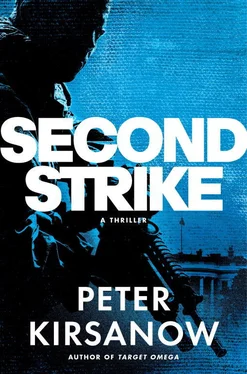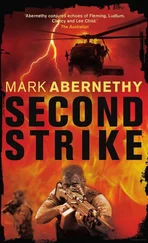There was no sign of activity. The drapes remained drawn. But for the four dead bodies in the woods behind the house, Garin would’ve concluded that the house had no connection to Bor. A reasonable person would think Bor would abandon the house for fear the four bodies would be discovered nearby. Therefore, reasonable people wouldn’t look for Bor at the house, which was precisely why it was a good place for Bor to be.
Garin settled against the fence and called Dwyer’s cell.
“Dwyer.”
“Congo call you?”
“He did. Those were good men. All my people are good people. They survived Fallujah and Ramadi only to die in tranquil northern Virginia.”
“I’m very sorry for you and their families.”
“Where are you?”
“At the dead guy’s house.”
“Don’t go in.”
“I won’t. But we need to keep eyes on. The execution of your four watchers proves the house is related to our old friend.”
“I’m all in, Mikey. Need anything from us?”
“Is Olivia still there?”
“Right across from me.”
“Can you forward this call to one of your secure phones? I need to give her some information.”
“Hold on.”
The line seemed to go dead for nearly a minute; then Olivia spoke from Dwyer’s communications room. “Michael?”
“Have you spoken to Brandt?”
“I have, and he’s going to brief the president. Not just about Bor, Michael. The Russians are doing peculiar things.”
“What kind of things?”
“There’s been considerable military movement. The Baltics, of course. Some of it appears to be staging movements. But there are Russian troops moving southward near the Caspian also, and Russian naval presence has increased significantly around the Persian Gulf.”
“You told Brandt this?”
“Yes. And he’s going to communicate his concerns to the president.”
“What are his concerns?”
Olivia was embarrassed. “Well, to be honest, I’m not really sure. I’ve told him that Bor’s possible presence in the US at the same time the Russians are involved in large-scale military maneuvers is something the president should be told about. He agreed.”
“There’s more, Olivia. Did Dan tell you about the suspected safe house and the four DGT men who were killed surveilling the house?”
“He did.”
“Also, earlier today five men tried to kill me.”
Garin heard a sharp intake of breath.
“Are you all right?”
Garin tried not to read into Olivia’s reaction, though the gasp made him pause.
“They’re dead. But that puts the exclamation point on everything to date. Not only has there been more than one attempt on my life, but there have been nine related killings in northern Virginia in a span of just a few hours. If there is any doubt something very serious is about to occur, it’s been completely erased.”
“I’ll let Jim know everything. I’m sure he’ll recommend to the president that the full resources of the intelligence community be applied to this.” She hesitated. “Are you all right?”
An expression of concern. Although it might not be anything more than simple courtesy. After all, most people don’t often talk with someone who’s been the subject of multiple assassination attempts. “I’m fine.”
“We have no idea what they’re planning, either here or in Russia, do we?”
“We can probably rule out an EMP attack.”
“But do you think it’s possible it’s something of similar magnitude?”
“I think it’s a mistake to underestimate the Russians and a mistake to underestimate Taras Bor.”
“I’m not sure we’ve ever underestimated him, Michael. He just seems always to stay one step ahead.”
“He’s more than just one step ahead now. He’s been invisible. But he’s here. There’s evidence of his presence from Dallas to Cleveland, from Atlanta to D.C.”
“Do you think he’s in the house?”
“Can’t say. Bor likes to move. If there’s anyone in the house, they’re part of his team. He might, however, drop in at some point.”
“You’re only there to perform surveillance, right?”
His subconscious registered the question as another possible expression of concern. “Just surveillance. We need to enlist the cavalry, Olivia. So impress upon Brandt the urgency of this. I need sanction and I need a reconstituted Omega, and I need them last month.”
“I will.”
“Good.”
“Just surveillance, Michael.”
“Just surveillance.”
MOSCOW,
AUGUST 17, 2:30 A.M. MSK
Egorshin couldn’t very well return to Tatiana’s apartment with soiled trousers. So after the degradation and humiliation at the hands of Stetchkin, he went to his own apartment, showered, and put on some fresh clothes.
He sat morosely at his kitchen table with a glass of vodka. He didn’t drink it; he rarely drank. It was just a security blanket.
Stetchkin was insane. He was also powerful and cunning—a terrifying combination of qualities in an enemy.
Stetchkin’s hatred for him was baffling, but Egorshin no longer dwelt on it. Regardless of the reason or lack thereof, Stetchkin had identified Egorshin as someone to torment, and there was nothing he could do about it. The important thing was survival. Egorshin was certain the reprieve he’d gotten earlier was fleeting and Stetchkin was determined to kill him.
He spun the glass slowly on the table. His immediate objective was to survive the next twenty-four hours with his prefrontal lobes still intact. The only person he knew who might help him achieve that objective was his uncle, whom he hadn’t been able to reach since leaving Stetchkin’s office. Morosov, he hoped, had spoken to President Mikhailov’s senior aide, Alexei Vasiliev. Mikhailov would stop this lunacy. Mikhailov needed Egorshin.
Or did he?
MOSCOW,
AUGUST 17, 2:35 A.M. MSK
Yuri Mikhailov was as tall as Stetchkin but nearly ninety pounds heavier. He’d been a discus thrower on the 1984 Soviet Olympic team, after which he’d spent a brief stint in the KGB. Before becoming the Russian president he’d amassed a small fortune in the energy sector, in no small part due to his position and contacts in the KGB.
Mikhailov was one of the few men in Russia not fearful of Stetchkin. In fact, Mikhailov found Stetchkin barely tolerable. More than once he’d considered getting rid of the man. But Stetchkin was efficient, effective, and useful. Once he ceased being all three, however, Mikhailov would cast him aside like a rotten apple core.
Mikhailov had reluctantly granted Stetchkin an audience. The man might be useful, but his presence was grating and bearable only in small doses, with appreciable intervals in between.
The pair had just sat a few feet apart on matching leather chairs in a large Baroque anteroom in Mikhailov’s office. Two small tables next to each held glasses of water. A massive chandelier hung overhead. They were alone.
“Chao-Li sends his regards, Aleksandr,” Mikhailov said, referring to the Chinese president. “He asked me to tell you how much he enjoyed your visit to Beijing last year during the joint exercises.”
“He is a good man,” Stetchkin said.
“He is better than his predecessor,” Mikhailov conceded. “But I do not trust him. His trade delegations have made repeated inquiries about traveling throughout lower Siberia, ostensibly to boost commerce to the benefit of both countries.”
“Given the current state of our economy in that region, I would say that may redound to our benefit, particularly the mining sector.”
Читать дальше












